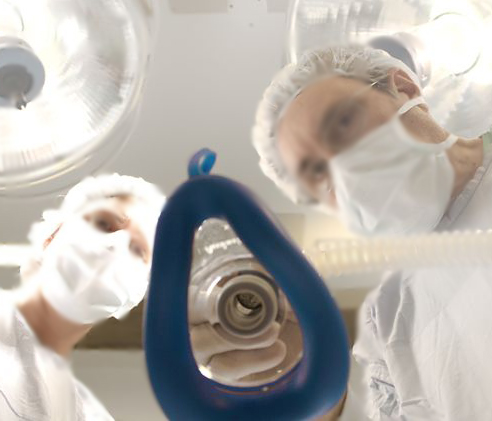
A visit to the doctor confirms your worst fear: SURGERY. Suddenly you cease to think about the disease that is plaguing your body and it all becomes about the upcoming and seriously daunting surgery. You get anxious and scared and seek people who can answer some questions that are running through your mind. Will I be seeing the surgery? Will I wake up of the Anaesthesia? When will I wake up? What if I wake up in the middle of the surgery? Will there be pain? If yes, how much pain? What can be done to have no pain during and after surgery? What will happen if the said surgery doesn’t go well, or as predicted? Will I come out of the surgery alive? But often these questions are not directed to the right person who can give us the right information. Have you ever consulted an Anaesthetist before you go to the operation theatre for the surgery and have your queries been addressed to? After practicing Anaesthesia for close to a decade now, I have realized that most patients go into surgery scared and with many of these questions still unanswered. Let me try to solve this mystery for you by answering some of the frequent questions that plague a person’s mind before surgery:
1. What is Anaesthesia? Anaesthesia literally means insensitivity to pain temporarily induced by drugs. It is a speciality of medicine which deals with temporary induced state with one or more of the following: Analgesia (relief from or prevention of pain), Amnesia (loss of memory), Paralysis (extreme muscle relaxation) and/or Unconsciousness. It is a temporary state where you are completely unaware of the surroundings controlled by various drugs given to you by a qualified Anaesthetist, who also take care of your vitals (heart beat, blood pressure, oxygen concentration, temperature, respiration or breathing and status of other organs like kidney, liver, etc.) while you are unaware of these experiences. Anaesthesia is science being researched and developed by medical science and is an important aspect of a successful surgery today.
2. Who is an Anaesthetist or Anaesthesiologist? An Anaesthetist (or Anaesthesiologist) is a highly trained specialist in the subject, (who has done specialisation/post graduation in Anaesthesia for 3 years, after 5 and half years of graduation i.e. M.B.B.S.), who makes all the decisions during surgery. She/he is responsible for the administration of anaesthesia and patients well being while under anesthesia and also the immediate post-operative care. Anaesthetists play a vital role in various areas of healthcare and hospitals these days. They are your perioperative physicians who take care of your illnesses prior to the surgery and also after the surgery. Anaesthetists are a vital team member of the Intensive care units or the critical care units. Some Anaesthetists also run pain clinics to take care of your long standing pain. Anaesthetists also take up the role of emergency physicians in trauma care and acute pain management. Anaesthetists are also key member of the hospital administration and management who can connect all the departments with ease.
3. What are the side effects of the anaesthesia that will be given to me? The medications given to you during anaesthesia are chosen as per your physical condition, and your pre-existing ailments. These medications are used in combination and the dosages are well calculated before administration and are associated with very minimal or negligible side effects. However, in some patients may experience reactions to the medications given, in the event of which the Anaesthetist will address to it immediately.
4. Does the Anaesthetist makes patients sleep during surgery and leaves the theatre? An Anaesthetist makes you sleep, takes care of your vitals throughout the surgery, awakens you, accompanies you to the recovery ward and takes care of you in the immediate postoperative period. She/he is mandatorily required to be present with the patient from the time the patient enters the operating room till the time the patient reaches the recovery room.
5. I am afraid of being in the operation theatre. Can you make me sleep before going in to the operation theatre? All patients are anaesthetised only after attachment of the standard monitoring and after securing an intravenous access. But for patients who are over anxious of the theatre they may be given some sedative or anti-anxiety medication in the preoperative ward, before going into the theatre. Usually your anaesthetist prescribes you some medications to be given in the ward which also helps you relieve anxiety and when you come to the theatre you might be in a light sleep.
6. I fear the needles. Is there any other way of making me sleep? Usually the anaesthetic medications are given to you through an intravenous cannula, secured in a vein in one of your hands which needs just one needle prick. It is mandatory for administration of anaesthesia. In children, they are either sedated with gases or an intramuscular injection and then intravenous access is secured. Same can be done for adults who have severe phobia for needle prick, as a special case.
7. Will I be seeing the surgery? Usually you will be completely unaware of the surgery; that means you will be under anaesthesia. In some cases where only part of your body is anaesthetised, either your lower half of the body or your any of your limbs, you may opt to see the surgery. Certain centres also record the surgeries to be seen later.
8. Will I wake up of the Anaesthesia? When will I wake up? Will I come out alive after the surgery? With the advancement of this medical speciality there are various medications whose combination is used for administration of safe anaesthesia and patients can be awakened within minutes of completion of the surgery. You will awaken, and very much alive, immediately after the surgery.
9. What if I wake up in the middle of the surgery? The Anaesthetised patient is closely monitored by the Anaesthetist who makes sure you don’t awaken in between surgery. The depth of anaesthesia can be well maintained safely with the advanced drugs available these days. Despite all the efforts, in certain cases where due to some genetic illnesses some patients awaken in between there is a very low chance of them knowing or remembering the said instance.
10. Will there be pain? If yes, how much pain? The patient undergoing anaesthesia is given Analgesia (pain killer) prior to the surgery and maintained throughout the surgery. You might wake up with a little burning sensation in the operated site but usually there is no pain or very minimal pain of the surgery for which your Anaesthetist will give you pain medication in the recovery ward. . Along with that, there are various techniques to block the pain mechanism of the surgery site which are done. This technique is also called Regional Anaesthesia. These injections are usually given while you are still asleep and when you awaken you are pain free.
11. What will happen if the said surgery doesn’t go well, or as predicted? Anaesthetists take all precautions for conduct of safe surgery. Despite all the efforts some patients might have complications during or after the surgery. All patients are monitored for such scenarios. Any patient who encounters such complication is taken to the intensive care units (I.C.U.) or critical care units for observation and further management.
12. What are the various Anaesthetic options I have? Anesthesia is broadly divided into General anaesthesia and Regional Anaesthesia. General anaesthesia is the one where you are completely unconscious and unaware of the surgery. Regional anaesthesia is again divided in various forms where a part of your body is anaesthetised during the surgery and can be combined with some sedation or even general anaesthesia. Spinal or epidural anaesthesia is one where lower half of your body is anaesthetised. Local anaesthesia is done in superficial surgeries where only the surgical part in anaesthetised. Nerve blocks are done, where the nerves supplying the surgical area are selectively anaesthetised and you feel no pain during the surgery and these can also be used for postoperative pain management. These are also combined in a surgery for better comfort and outcome.
13. I have heard from my relatives that Spinal anaesthesia causes backache. Is it true? Backache is predominant in mankind as a punishment for our standing posture. In pregnancy because of poor back care patients experience backache. Rather these days various types of epidural medications and treatment are given for various types of backache. In pregnancy the back pain is due to inadequate exercise, and back care. The spinal anaesthesia is safer option for you and your baby during a caesarean section (unless contraindicated for some coexisting illness). These days epidural Anaesthesia is being given for painless normal deliveries, which are also safe for you and your baby.
14. Minor surgery involves no risk. Is it true? The severity of surgery is not the only factor that determines the risk involved. Your coexisting diseases also play a major factor in risk assessment. For example – a patient with severe cardiac problem is very high risk for surgery even for a small biopsy.
15. The risk involved is due to Anaesthesia. Is this true? Some patients think that the risk involved in a surgery is only due to Anaesthesia, which is not true. The anaesthetists are well trained to administer you anaesthesia with your coexisting diseases safely, it is rather the stress of surgery (especially without anaesthesia) that is more risky than undergoing surgery under anaesthesia. The anaesthetists just want to correct the coexisting problems as much as possible and then take you for surgery so that the surgery is done more safely, medically optimise your health condition prior to surgery.

Safe and successful surgery is a result of many factors involved in surgery including a good and responsible anaesthetist. It is very important to meet your Anaesthetist before any surgery, as your Anaesthetist evaluates your health status, your coexisting illness or diseases, status of your vital organs like the heart, kidneys, liver, etc and co-relates with the surgery involved and accordingly decides the Anaesthesia best for your surgery in your own health condition. This is also the best time to ask the questions you want to ask your Anaesthetist about the unawareness and postoperative care.
